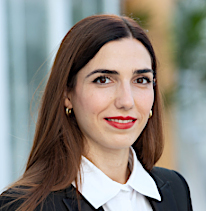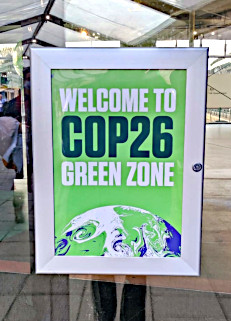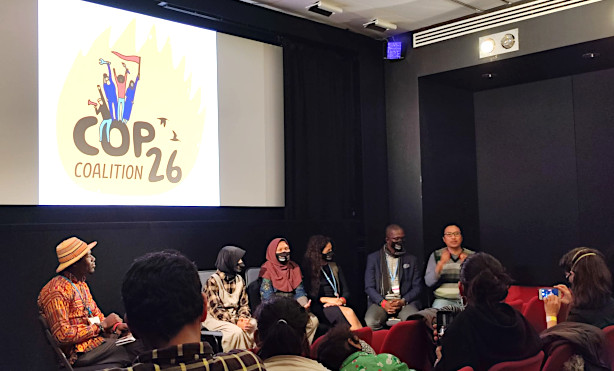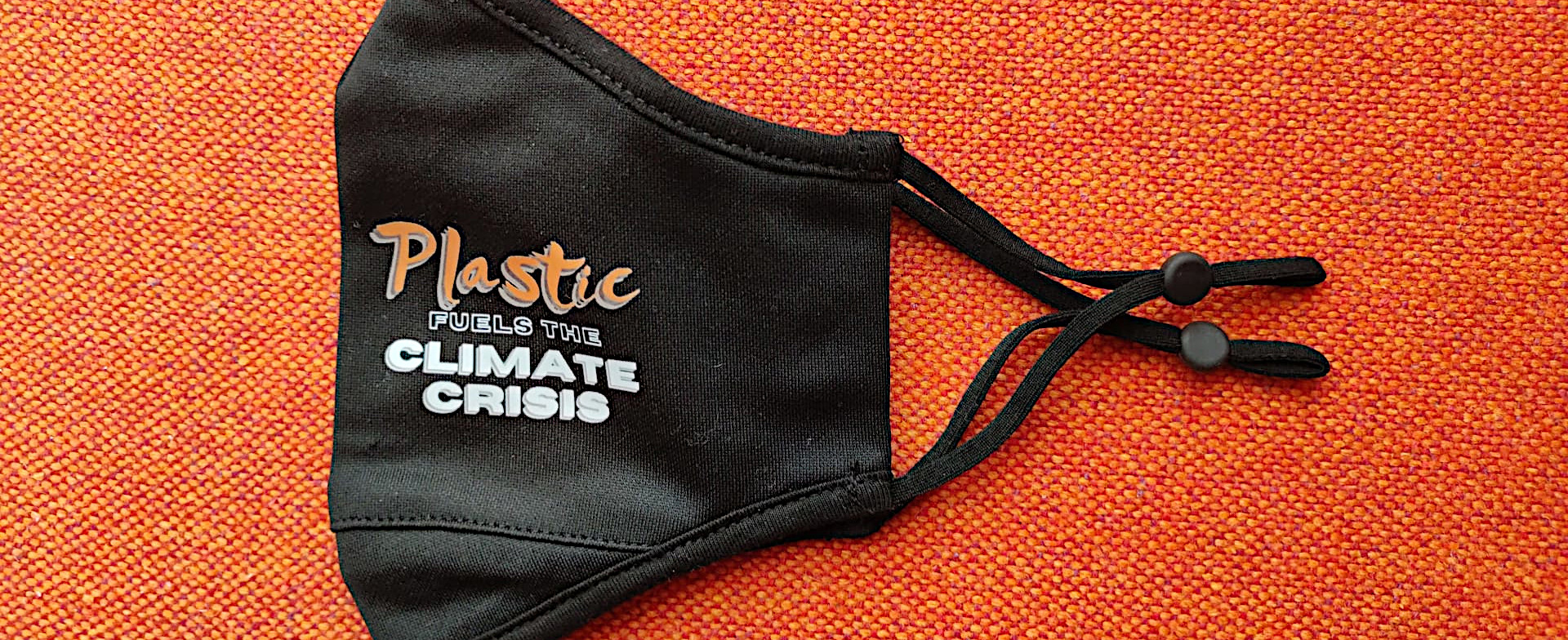
What lies behind Net Zero? In her personal account of attending COP26, The University of Surrey’s Lydia Milly Certa asks which topics were left off the main agenda – and why.
‘Plastic fuels Climate Change’. This slogan was printed on the face masks of one the activists who went to COP 26 to put forward projects whose main aim is mitigation and adaptation of Climate Change by shutting down single use plastic usage, both within the walls of a heavy policed blue zone and outside it.
This is the story of my experience in COP26: as part of my PhD research, I had the opportunity to go to Glasgow and take part in some of the events both inside the Green Zone, and at the fringe of the official forum, that is to say side events and the streets. On my first day in the Green Zone, it was clear it was an exhibition and showcase of innovation and organizations. It looked like a trade fair with all the stalls and people nervously running up and down halls and corridors to get to their meetings, to listen to some talk, but mainly to do some networking and getting their business deals done.

I spent four days within the Green zone and its aura of formality and informativeness, at times mixed with some greenwashing. And although there were several talks every day, on the four days I have spent in the Green Zone none of them focused on the issue of Plastic pollution. I expected that a prestigious event such as COP, whose main purpose is to fight Climate Change, would have included in its everyday agenda a plethora of activities to spread awareness among people about the huge problems that plastic pollution is causing around the world. Instead, the restaurant of the Green Zone was a show off of single use plastic: salads, mains, desserts and snacks were wrapped in plastic foil or served in single use plastic food containers and boxes. I did not expect that, and from the second day, I chose to bring along my own food box lunch from home.

On the same first day I entered the Green Zone, I decided to attend an evening event about Plastic pollution outside the official COP26 formal forum. The event name was ‘Girls for Future’ and was part of a side event called the People’s summit, organized by a coalition of activists and associations called COP26coalition. As I entered the room, I could feel the atmosphere was completely different, vibrant. People wore normal informal clothes and chatted relaxed about the events they attended. I was showed to my seat and as soon as I took off my coat and scarf, the movie started. It is about four young girls aged between 11 and 14 and their lives completely and utterly affected by Climate Change. One of them, Nina, lives in East Java, Indonesia and shows how her neighbourhood has become a dumping ground where many western countries send their garbage. There, resilient locals are trying to get the best out of it and to survive they sort the rubbish to separate the plastic that can be recycled from the other rubbish, as selling it represents a form of low but needed income. Some of it will be recycled; the useless part instead will be incinerated or dump in rivers, thus polluting air, water and ground.
After the movie, a panel chaired by Desmond Alugnoa – Program associate and coordinator of GAIA Africa (Global alliance for Incinerator alternatives) – highlighted the urgency of the issue by giving voice to some of the activists, scientists and common people affected by pollution and Climate Change in developing countries and Global South. Once the panel was over, I rushed to the front of the stage and asked Desmond to have a meeting to talk about it.

During our meeting he explained to me in detail that he was in COP to ensure that some activities related to mitigation and adaptation would include the topic of plastic pollution and single plastic usage. In his words and mask, the message was crystal clear: ‘Plastic fuels Climate Change’ and especially in Africa where it is destroying people’s livelihood in terms of the farmland. Plastic is everywhere in farms, farmers are not able to grow crops properly and animals are swallowing plastic and are killed by it. This in turn ‘it’s further deteriorating the economy […] and that is where the climate crisis will increase. And so we think that plastics fuels the climate crisis’.
I thought the movie screening and the activist testimony were very important and I decided to read some of GAIA’s publications on Climate Change and Plastic. They all say the same thing ‘Plastic is Carbon’ and ‘net zero’ is a myth carefully crafted by industries and governments to disguise the ongoing endless production of plastic, and thus, maintaining the status quo of business as usual.


An insightful read on behind the curtains of COP 26 and the net-zero fiasco (and its greenwashing).
Thank you Lydia for this valuable insight into COP26 – quite a different view from the official media. I particularly liked the report on the meeting with Desmond from GAIA Africa. I am reminded how, a while back when I put together a proposed project on the problem of plastics pollution in African countries, one reviewer commented that Africa did not have such a big problem as yet with pollution from plastics. It is good for that message to be corrected and your blog was really helpful in putting the record straight.
Thank you Lydia for these insights on COP26 and on the work of GAIA.
Great job Lydia, you were so keen at documenting happenings in and out of the walls of COP26. i’m glad to see your post
Congratulations Lydia! Your experiences are very valuable for the understanding of how COP 26 thinks about plastic pollution.